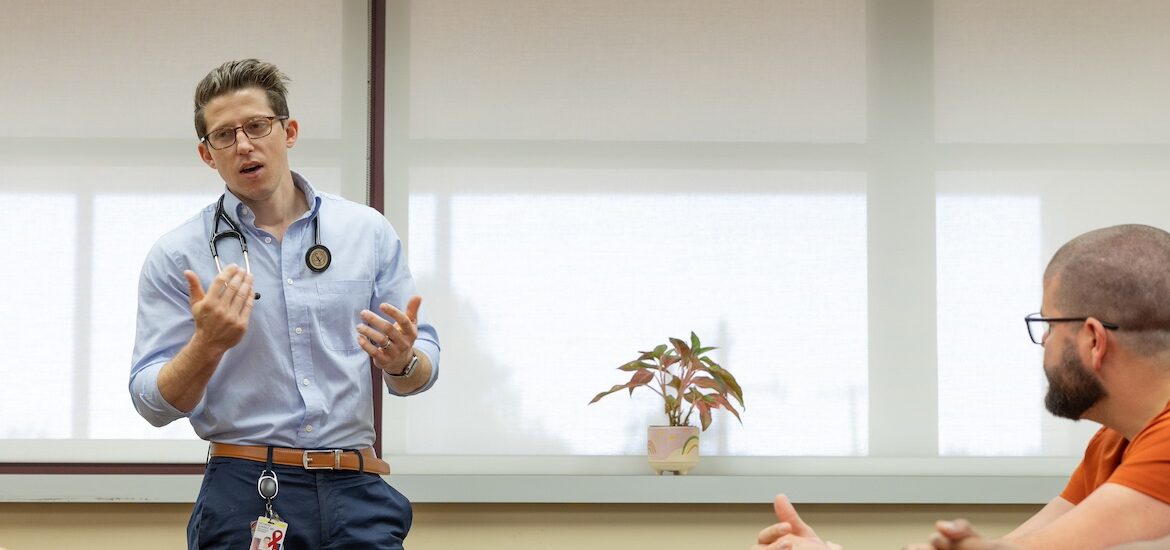Cancer diagnosis sparked a career aspiration pivot and a newfound desire to major in Biological Sciences
A Personal, and Candid, Interview with One Cooper Medical School of Rowan University Graduate
Just as Richie Suarez was about to kick off his college career at Rowan University, the universe had other plans. Richie shares with us his experiences and thoughts – from being diagnosed, the impact this had on his collegiate journey, through his shifting personal and professional goals, to today as Dr. Suarez helping young patients.
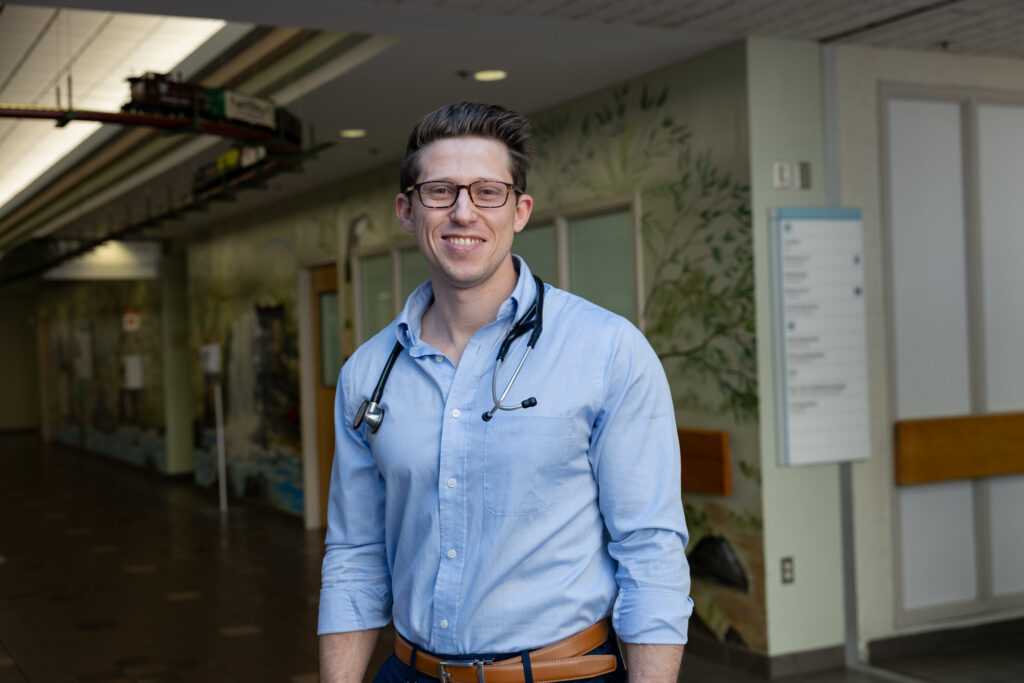
Take us back to August 27th, 2010.
“I was 18 years old, just finished high school, and was super excited to start playing baseball at Rowan University. Throughout the summer, I started getting sick, I lost some weight, and didn’t really think much of it as I didn’t want to interrupt my summer. I thought I just had a stomach flu, but toward the end of the summer, I realized it was a bigger problem when my family and I realized I’d lost almost 20 pounds, headaches weren’t going away, pain in my joints wasn’t going away.
“We went to my family physician, had some blood work, and they said I had to go to the hospital right away to rule out what they hoped was a miscalculation. My white blood cell count was 158,000. For comparison, about normal is 10,000; and they confirmed that I had leukemia. In the next couple of days, I was sent to a different hospital where I began treatment and specifically was diagnosed with pre-B acute lymphoblastic leukemia.”
For comparison, about normal is 10,000; and they confirmed that I had leukemia.
How did you process getting diagnosed with cancer?
“When you’re 18, it’s hard. There’s a lot of shock. You go through all the stages of grief. Fortunately for me, I had an incredibly supportive family, really great friends, and I wouldn’t have been able to get through it without them. But really, it’s a lot of shock in the beginning. It wasn’t until after about five or six weeks in the treatment when I finally left the hospital and got home, when it really hit me and I realized … Hey, just because I’m out of the hospital doesn’t mean I’m better.”
Did Rowan help accommodate your cancer diagnosis and treatment? In what ways were you supported?
“As soon as it happened, in the very beginning my family was the one reaching out to them and I didn’t do a lot of talking. I just said, ‘Hey, I’m not going to be [on campus].’ But they were incredible. They were constantly reaching out, the baseball team was reaching out; I was getting sent t-shirts and things like that, asking if I wanted to come sit with the team, meet anybody, things like that. So they were really supportive. Then when I got back to college, they were really, really helpful, offering any extra time I needed, anything like that.”
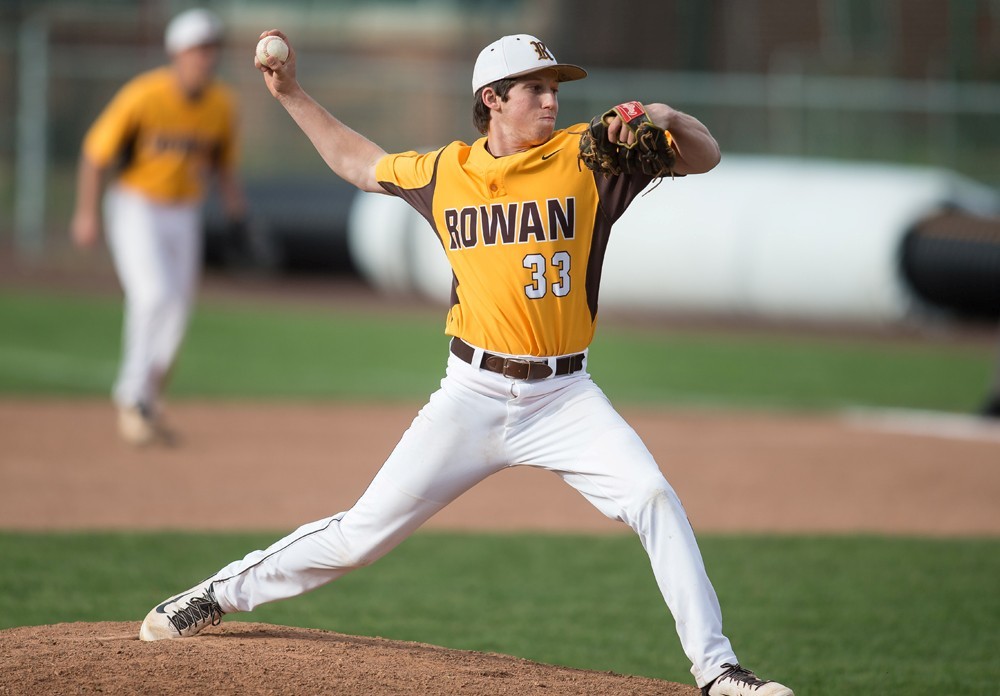
As time goes on, it’s revealed you had avascular necrosis. Can you explain what AVS is and how you went about handling that diagnosis as well?
“So during treatment, there’s risks and rewards when you get chemo, right? And one of the side effects that I had developed is called avascular necrosis, just from the high dose steroids I was on. And basically your blood flow gets cut off in your bones, the bones break down and die, and unfortunately it got pretty bad in my hips. I was back at school at this point, my hair grew back and for anyone looking in, they wouldn’t know that I was on chemo or in treatment. So, I believe it was the fall of 2012, I finished my semester a month early. That way I had ample time during my winter break and I had both my hips replaced during that time and then rehab and was able to come back to school in the spring.”
When thinking about advice you’d give to someone diagnosed at your age, or maybe even younger, what advice would you give or something that you learned throughout your whole experience?
“Yeah, I think when you first get told, especially at that age, there’s not going to be a whole lot of things that’s going to make it better. You’re going to go through everything, acceptance and all. But I think if I had to give more practical advice, it’s to try to just get through today, like right now and it’s going to be impossible to not look forward to not be worried about what’s going to happen tomorrow, in a week, in a year, in five years. But whatever that task is, whatever that hurdle is today, just worry about that. And when you do that one day at a time, it makes things a lot easier.”
It’s got to be a lot both physically and mentally to go through something like that at any point in life, especially in the beginning of your college career. How do you stay optimistic during all that time?
“It was a lot of support I have; I’m wildly lucky. I have a really good family, a lot of good friends, and a wonderful girlfriend at the time, who is now my wife, Kelly, and I couldn’t have done it without them. At the time I was a very different person. I had a huge chip on my shoulder. I was mad at the world. I was a teenager who had cancer and I had dreams of playing baseball my whole life and just got told I needed to get my hips replaced. So that chip on the shoulder, although that isn’t necessarily something you want, it helped me stay pretty determined and it helped me work really hard to kind of get through treatment, get through rehab for my hips and all. I don’t think I would have recovered as well if I didn’t have this goal at the end of it, of getting back to playing college baseball.”
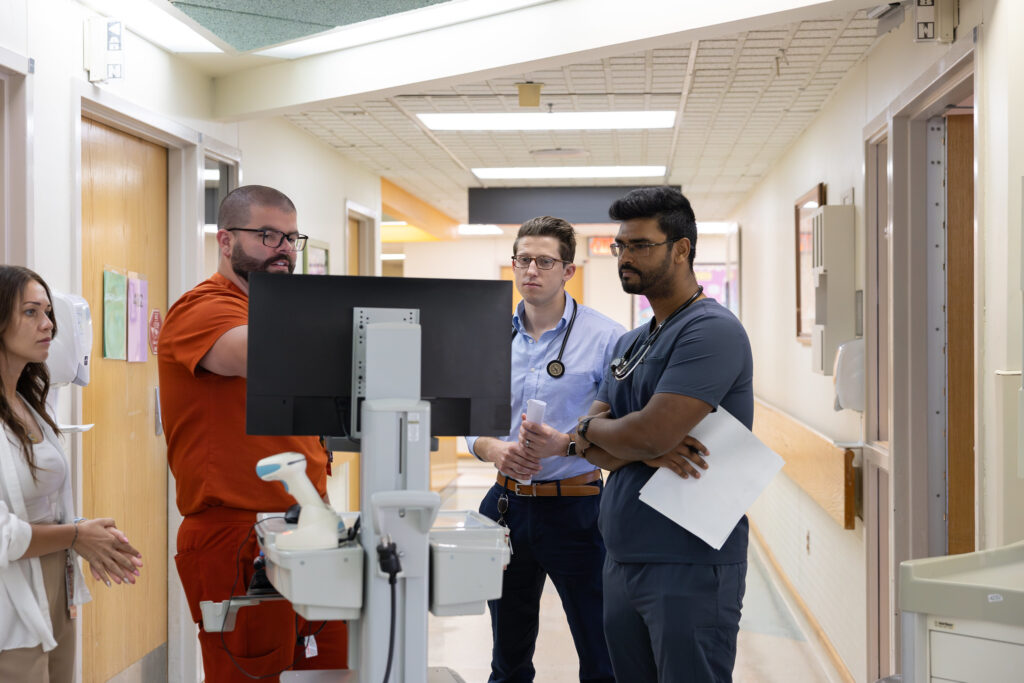
They say being told something along the line of “you’ll never do this again” is a great form of inspiration, and in your case, that was baseball. Could you walk us through that journey of trying to prove the doctors wrong?
“Baseball was a huge part of my life growing up. And when you’re a kid, if someone asked me, ‘Hey, what are you going to be when you grow up?’ I would say a professional baseball player without a doubt. I think a lot of us play sports and we’re kids, we have those dreams and I was still holding on to it. And I think that happens to a lot of kids with cancer. They’re holding on to that normalcy before the diagnosis and trying to come to terms that life is going to be different afterwards. It’s tough, especially with someone who’s an athlete and they have a joint replacement like I did or something similar. So that was tough. Trying to get back to that normalcy was what I was trying to do. It kept me really determined. It made me rehab way harder than I probably would have or if I wasn’t trying to get back to a sport and try to play at a competitive level.
“Getting back to play was incredible. That’s when I started to feel normal again. I was really thankful for my teammates and my coaches; they were wonderful. It was a weird time in my life because I was having a transition in life, right? So I was going from ‘baseball is my world’ to now I want to become a doctor. And when I finally got back to playing baseball, those couple of years that I played were really like an overlap period where I wanted to play baseball. I wanted this, but I knew the next part of my life baseball was just going to be a hobby, something else I did.”
I was mad at the world. I was a teenager who had cancer and I had dreams of playing baseball my whole life.
Elaborate on that shift in perspective, when did you realize that becoming a doctor was something you wanted to pursue?
“It wasn’t like a eureka moment that, ‘this day I knew it.’ It was kind of a process for me. One of the things that helped me a lot in treatment was knowing more. I felt like the scariest thing in the world is the unknown. So the more I knew about my treatment, the side effects that I could have and there weren’t any surprises. So even if it was something bad, I could at least prepare for it. When my doctors would come in, I’d want them to walk me through my labs and teach me about my cancer or teach me about chemo and all.
“Learning more was a protective thing for me as someone going through treatment, but also, I realized I became fascinated with it. I had a lot of really great interactions with doctors, nurses, residents, and all kinds of people throughout the hospital, and they kind of gave me their opinions and thoughts of what I should go into and that eventually developed into wanting to become a pediatric oncologist.”
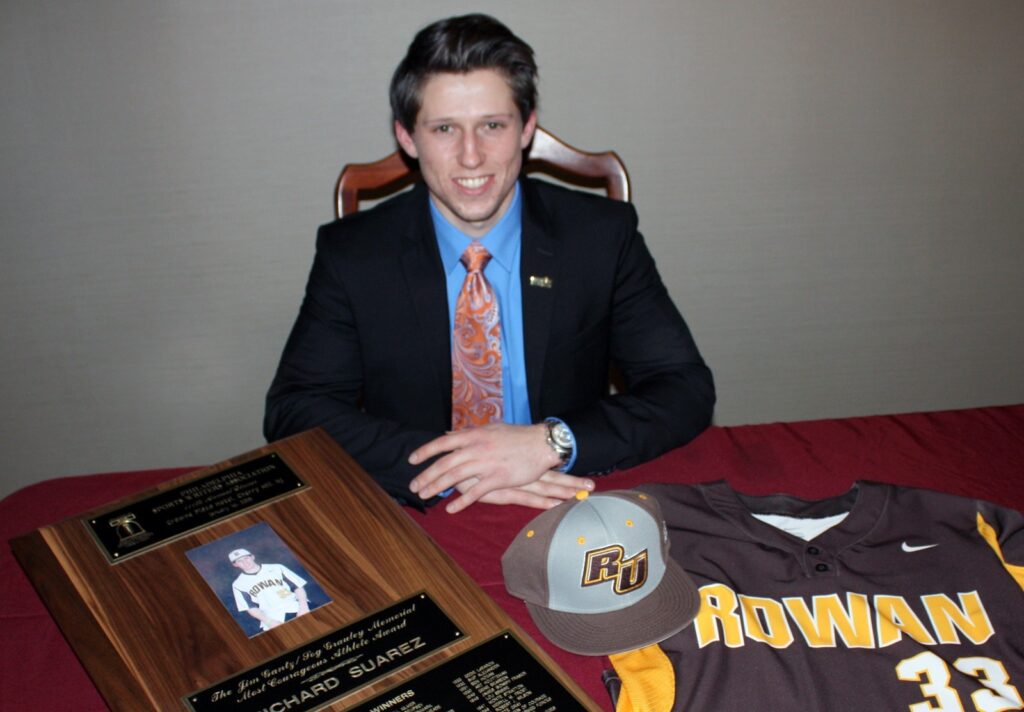
What was the educational path like for that career change? Were you in a field that made it easy or how was that shift for you?
“The major I ended up choosing, which was going to help me to get into medical school, was biology; I [also] had a minor in chemistry. I was accepted into the Cooper Medical School of Rowan University and started that in 2016. So that was four years of medical school all through 2020. Then I matched into a pediatric residency here at Saint Christopher’s. I did three years of residency training and chose, and applied for, this chief resident year, which is an additional fourth year. So we’re 12 years deep so far and [summer 2024] I’ll start three more years of pediatric hematology oncology fellowship.”
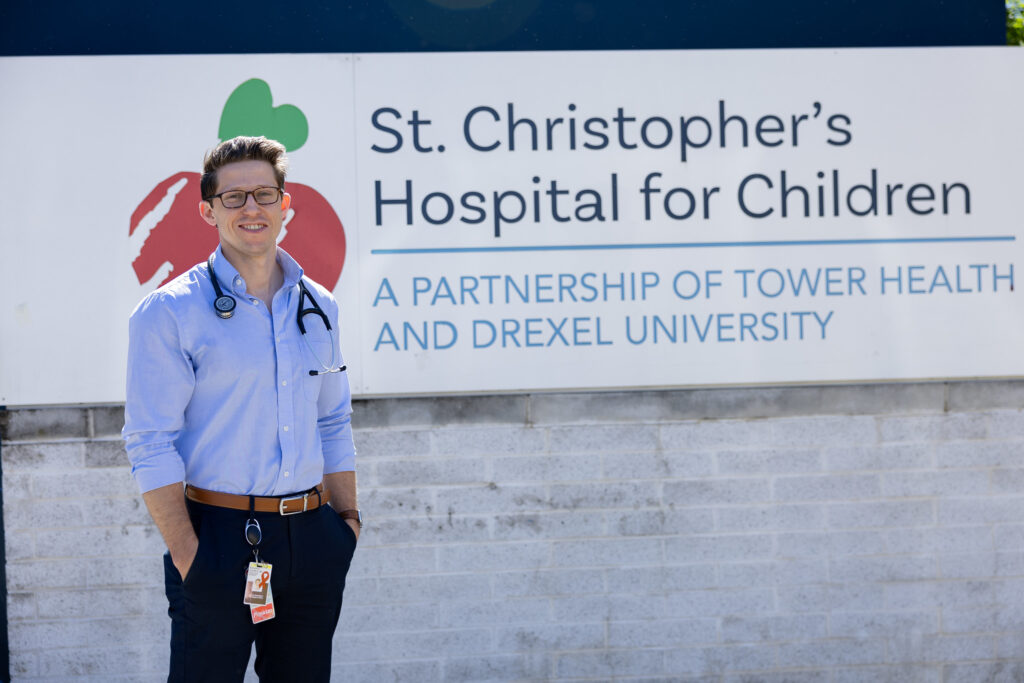
In a previous interview with the NCAA you mentioned that you did what anyone else would have done in that situation and you “took your life back.” Can you elaborate on what you meant by this?
“I think especially when you’re a teenager, like I said, the one thing you crave the most is normalcy. I probably said the same thing years ago. You just want your life back. It was taken from me and I’ll do anything to get it. And for me at the time, it was well, normal for me was to play baseball and go to college. So in order for me to play baseball in college again, I had to rehab really hard, do a lot of things to recover from getting my hips replaced and chemo and things like that. And so it was just what I had to do.”
You just want your life back. It was taken from me and I’ll do anything to get it.
Now that you’re in the medical field, in what ways do you hope to make a difference in the lives of the children that you come into contact with?
“I just know that I had some great experiences with different people throughout treatment, and there’s a few doctors that stand out to me who were wildly motivating, that kept my goals and future realistic, but optimistic. I think it made a huge difference for me. When I interact with patients, they don’t necessarily need to know that I had cancer, but I can definitely understand where they’re coming from. I remember what helped me so much, even if that means it’s a conversation with a parent, knowing from what my parents had told me, what helped them as parents. So, if I can do anything to help those kids out, I will.”
In the process of helping make that difference, how do you go about integrating your personal experiences? Is that something you do, how do you form that line?
“I think whenever someone goes through cancer or is in treatment and things like that, it’s unique to every individual. Even if someone has the exact same diagnosis I had, they can have varying experiences, and I don’t want it to be about me when I’m talking to that patient. I don’t want to give someone false expectations or hopes or fears that really maybe doesn’t apply to them. So there’ve been very few instances, maybe one I can think of where one of my mentors that I was working with as a student, actually said, ‘Hey, if you spoke to this patient and told them what you went through, it might be really helpful.’ So that’s probably the only time I did, but I think, you know, it’s not about me at that point, and I think I can use my experiences to help them, maybe say things that I wish were told to me and kind of help parents and things like that.”
A medical student said, ‘Hey, if you spoke to this patient and told them what you went through, it might be really helpful.’
Do you have a particular area of pediatric care that you’re most passionate about?
“It’s kind of developed over the years. You know, [hematology/oncology] is where I want to go, and I definitely want to stay on the oncology side. Leukemia/lymphoma is my interest because of my personal experiences; but things have changed a little bit. I want to continue with patient care and working with patients the rest of my life, but now I have a little bit more interest in medical education after having this teaching role this year as a chief. But also, I have a lot of interests in research and where my research is going to go. I’m not sure yet, but I’m really excited to kind of figure that out in the next year of fellowship.”
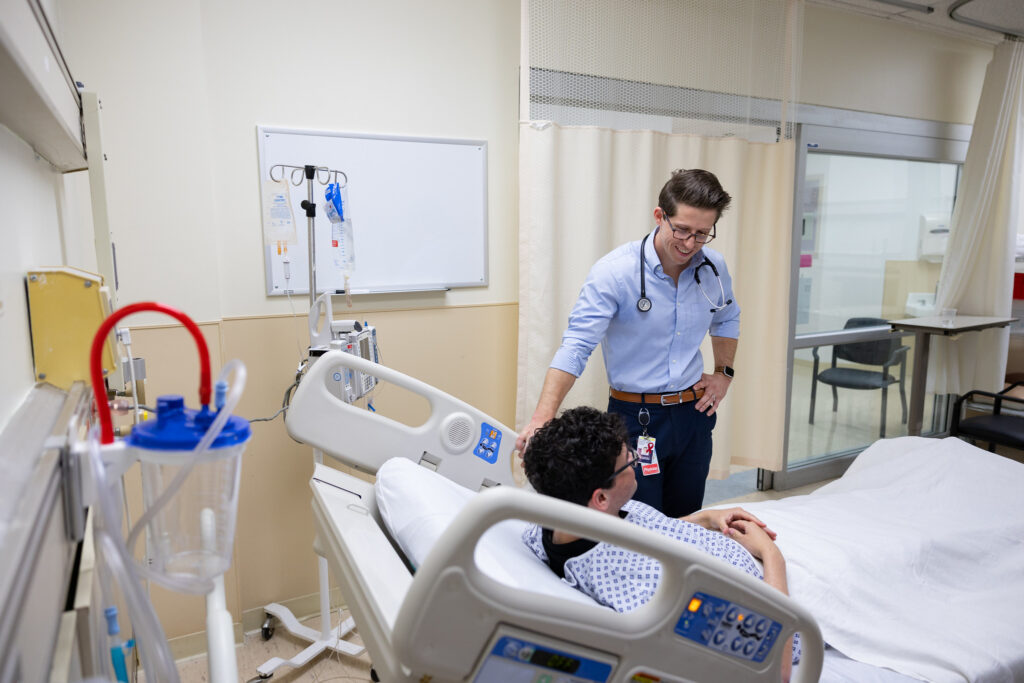
What impact do you hope to have on the world? When people mention the name Richard Suarez, what do you hope comes to their mind?
“I’m not sure yet. I think that’s going to change throughout the years. I think when it’s an individual patient, I hope they think good things. I mean, if I’m meeting somebody in my job, it’s, you know, not necessarily good news. They’re sick or in my future job as an oncologist, you know, they’re getting pretty bad news. So the association probably won’t be great, but I hope I can make it as positive and motivating as an experience that it can be and just leave them with that they can trust me and if they need anything, I’ll be there.”
Knowing the difficulties of your job and how that may affect your day to day life, how do you deal with that? Especially when, as you said, if patients are seeing you, it’s probably not good news?
“I have the best wife in the world and, I mean, she’s wildly supportive. She knows that I get stressed out in my job and things like that. So she’s wonderful and patient. But for me, I usually try to stop at the gym on the way home and just get the stress out. And, you know, yes, the job is stressful and bad things happen, but overall it’s a net positive. I love my job, the experience I have with these kids and talking to them, seeing them is incredible. So for the most part, I end my day pretty happy. And yes, there are bad days and things. But you know, I go to the gym and you just kind of accept that it’s part of the job. I signed up for it, you know, and at the end of the day, I’m still very lucky. There’s a lot of people that would love to be in this situation. And I always kind of tell myself to zoom out. And even one of my bad days is still a pretty darn good day.”
Do you feel your diagnosis was a curse or more of a blessing in disguise for you?
“I used to get this question a lot, like in college and like I said, I was a very different person. And someone would say, ‘If you go back and, like, change, you don’t get cancer, what would you say?’ And I’d say, ‘yeah, don’t give me cancer.’ Without a doubt.
“Now I am married to my best friend. We have a baby boy. I’m a doctor now. I’m going to be training at an incredible program and I’m really happy. I don’t know if I’d be in this situation if I didn’t get cancer. I don’t know what would happen. So at this point in my life, I wouldn’t change a thing.”
Alumni Success Stories
Explore how our alumni propel their Rowan University education into lasting success, as highlighted through our alumni success series. From Rowan University student to lifelong member of the Rowan University Alumni Association, Rowan Profs thrive at every stage of their journey. Go Profs!
At this point in my life, I wouldn’t change a thing.

